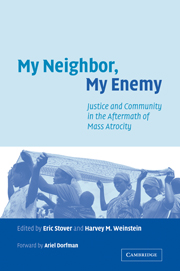Book contents
- Frontmatter
- Contents
- List of contributors
- Foreword by Ariel Dorfman
- Acknowledgments
- Introduction: conflict, justice and reclamation
- Part I Institutional approaches to justice
- 1 A world unto itself? The application of international justice in the former Yugoslavia
- 2 Legal responses to genocide in Rwanda
- 3 Localizing justice: gacaca courts in post-genocide Rwanda
- 4 Exhumation of mass graves: balancing legal and humanitarian needs
- 5 Witnesses and the promise of justice in The Hague
- 6 Reparations in the aftermath of repression and mass violence
- Part II Social reconstruction and justice
- Part III Survivors and justice
- Conclusion: a common objective, a universe of alternatives
- Index
3 - Localizing justice: gacaca courts in post-genocide Rwanda
Published online by Cambridge University Press: 05 May 2010
- Frontmatter
- Contents
- List of contributors
- Foreword by Ariel Dorfman
- Acknowledgments
- Introduction: conflict, justice and reclamation
- Part I Institutional approaches to justice
- 1 A world unto itself? The application of international justice in the former Yugoslavia
- 2 Legal responses to genocide in Rwanda
- 3 Localizing justice: gacaca courts in post-genocide Rwanda
- 4 Exhumation of mass graves: balancing legal and humanitarian needs
- 5 Witnesses and the promise of justice in The Hague
- 6 Reparations in the aftermath of repression and mass violence
- Part II Social reconstruction and justice
- Part III Survivors and justice
- Conclusion: a common objective, a universe of alternatives
- Index
Summary
One day in June 2002, Donatilla Iyankulije, a 27-year-old farmer with no more than a ninth grade education, found herself in the extraordinary position of presiding over a ceremony attended not only by the public but by numerous provincial and national officials, and members of the national and international press. Iyankulije, who lived in the Gishamvu Sector of southern Rwanda, assumed this important public role because she had been chosen as president of a local gacaca court, a new grassroots legal mechanism adopted by the Rwandan government to respond to the legacies of the country's 1994 genocide. The government had selected Gishamvu Sector as one of twelve sectors in the country in which to test the gacaca system, and as president of the gacaca court in one of Gishamvu's three cells, it fell to Iyankulije to preside over one of the inaugural sessions of the gacaca courts held across the country that day.
The Rwandan government's decision to implement gacaca grew out of extensive national-level discussions over the country's future in the late 1990s, in which it was determined that citizen participation in the search for justice would be critical, not only for the manifestation of the truth about what happened in the genocide, but also to the creation of a conducive environment for the reconciliation of Rwandans. Modeled after a traditional Rwandan dispute resolution mechanism but adapted to modern legal sensibilities, gacaca was envisioned as a vast program that would involve a large part of the population either as judges or witnesses.
- Type
- Chapter
- Information
- My Neighbor, My EnemyJustice and Community in the Aftermath of Mass Atrocity, pp. 69 - 84Publisher: Cambridge University PressPrint publication year: 2004
- 13
- Cited by



